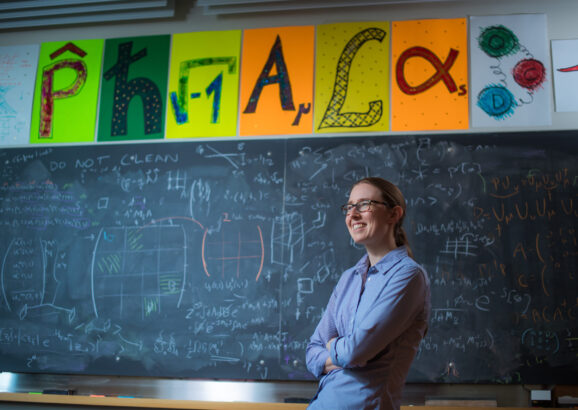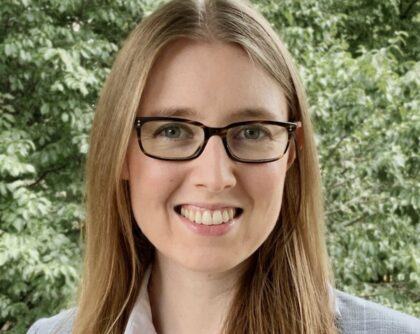Phiala E. Shanahan
Research Interests
Professor Shanahan’s research interests are focussed around theoretical nuclear and particle physics. In particular, she works to understand the structure and interactions of hadrons and nuclei from the fundamental (quark and gluon) degrees of freedom encoded in the Standard Model of particle physics. Shanahan’s recent work has focused in particular on the role of gluons, the force carriers of the strong interactions described by Quantum Chromodynamics (QCD), in hadron and nuclear structure; using analytic tools and high performance supercomputing, she recently achieved the first calculation of the gluon structure of light nuclei, making predictions which will be testable in new experiments proposed at Jefferson National Accelerator Facility and at the planned Electron-Ion Collider. She has also undertaken extensive studies of the role of strange quarks in the proton and light nuclei which sharpen theory predictions for dark matter cross-sections in direct detection experiments. To overcome computational limitations in QCD calculations for hadrons and in particular for nuclei, Prof. Shanahan is pursuing a program to integrate modern machine learning techniques in computational nuclear physics studies.
Courtesy of Perimeter Institute for Theoretical Physics | YouTube
Biographical Sketch
Phiala Shanahan grew up in Adelaide, Australia, and obtained her BSc from the University of Adelaide in 2012 and her PhD, also from the University of Adelaide, in 2015. Before joining the MIT physics faculty in July 2018, Prof. Shanahan was a Postdoctoral Associate at MIT from 2015-2017, and held a joint position as Assistant Professor at the College of William & Mary and Senior Staff Scientist at the Thomas Jefferson National Accelerator Facility from 2017-2018.

Phiala Shanahan is seeking fundamental answers about our physical world
With supercomputers and machine learning, the physicist aims to illuminate the structure of everyday particles and uncover signs of dark matter.
Awards & Honors
- 2023 // Innovator of the Year, South Australian Woman of the Year Awards
- 2022 // Ruby Payne-Scott Medal (Australian Institute of Physics) "for key insights into the structure and interactions of hadrons and nuclei using numerical and analytical methods and pioneering the use of machine learning techniques in lattice quantum field theory calculations in particle and nuclear physics."
- 2022 // University of Adelaide James McWha Distinguished Alumni Award
- 2021 // Wu-Ki Tung Award for Early Career Research on QCD "for pioneering studies of long-wavelength and nuclear non-perturbative QCD effects in discretized space and time, and for applications of machine learning to lattice field theory."
- 2021 // Maria Goeppert Mayer Award (APS) "for key insights into the structure and interactions of hadrons and nuclei using numerical and analytical methods and pioneering the use of machine learning techniques in lattice quantum field theory calculations in particle and nuclear physics."
- 2020 // Kenneth G. Wilson Award for Excellence in Lattice Field Theory "for excellence in the study of hadrons and nuclei in lattice QCD and for pioneering the application of machine learning and artificial intelligence techniques to lattice field theory."
- 2020 // Appointed Class of 1957 Career Development Professor
- 2020 // Included in "SN 10: Scientists to Watch", Science News
- 2020 // Teaching With Digital Technology Award, MIT
- 2020 // DoE Early Career Research Award
- 2018 // National Science Foundation CAREER Award
- 2018 // Emmy Noether Fellow, Simons Foundation
- 2017 // Forbes Magazine's 30 Under 30 in Science
- 2017 // APS Dissertation Award in Hadronic Physics "for outstanding achievements in elucidating the role of strangeness and charge symmetry breaking in nucleon structure using lattice quantum chromodynamics and effective field theory techniques."
- 2016 // Bragg Gold Medal, Australian Institute of Physics “for the most outstanding PhD thesis under the auspices of an Australian university”
Key Publications
-
Equivariant Flow-Based Sampling for Lattice Gauge Theory
Gurtej Kanwar, Michael S. Albergo, Denis Boyda, Kyle Cranmer, Daniel C. Hackett, Sébastien Racanière, Danilo Jimenez Rezende, and Phiala E. Shanahan
Phys. Rev. Lett. 125, 121601 – Published 15 September 2020 -
Pressure Distribution and Shear Forces inside the Proton
P. E. Shanahan and W. Detmold
Phys. Rev. Lett. 122, 072003 – Published 22 February 2019 -
Isotensor Axial Polarizability and Lattice QCD Input for Nuclear Double-β Decay Phenomenology
Phiala E. Shanahan, Brian C. Tiburzi, Michael L. Wagman, Frank Winter, Emmanuel Chang, Zohreh Davoudi, William Detmold, Kostas Orginos, and Martin J. Savage (NPLQCD Collaboration)
Phys. Rev. Lett. 119, 062003 – Published 10 August 2017 -
Collins-Soper kernel for TMD evolution from lattice QCD
Phiala Shanahan, Michael Wagman, and Yong Zhao
Phys. Rev. D 102, 014511 – Published 22 July 2020
